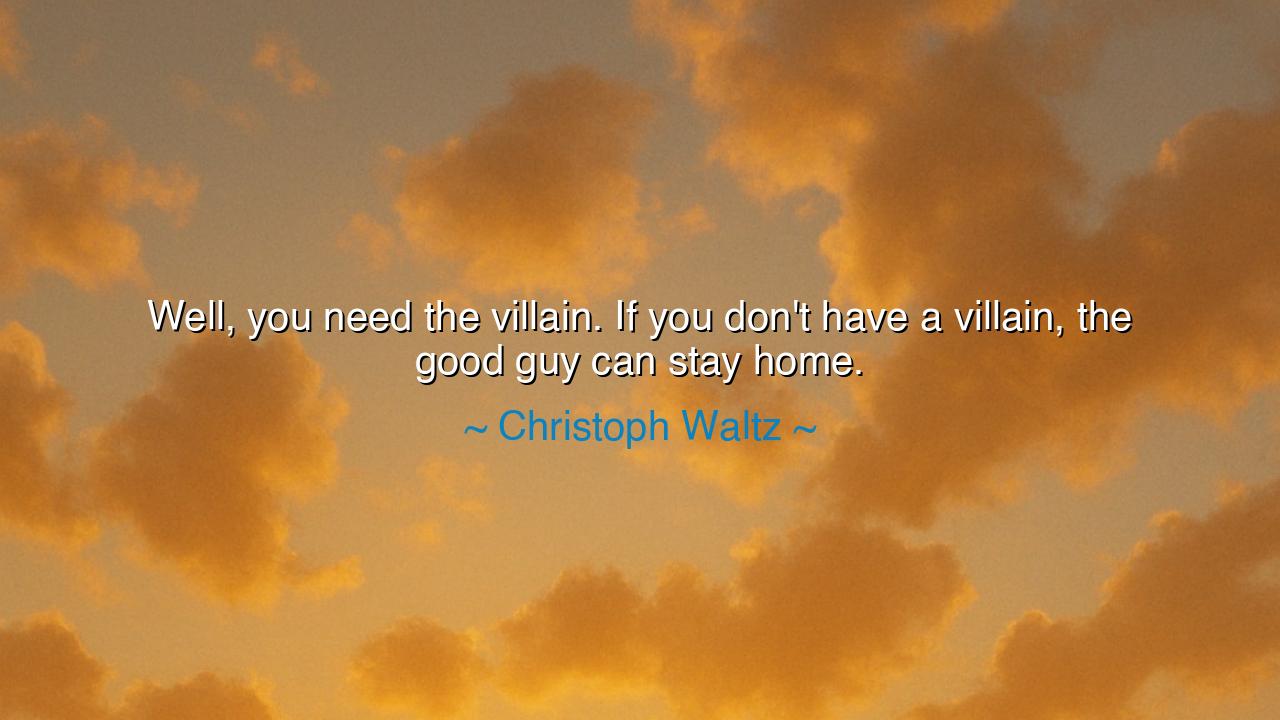
Well, you need the villain. If you don't have a villain, the good






In the words of Christoph Waltz, actor of great depth and insight, there lies a wisdom that extends far beyond the stage or the screen: “Well, you need the villain. If you don’t have a villain, the good guy can stay home.” At first, this statement may seem simple — a reflection on storytelling, perhaps even humorous — but within it beats the timeless truth of the human condition. For without opposition, there can be no courage; without darkness, there can be no light. The villain, whether in art or in life, is not merely an adversary — he is the catalyst of transformation, the fire that tests the purity of virtue and reveals what strength truly means.
Christoph Waltz, who has portrayed both villains and heroes with equal mastery, understands that every great story requires conflict. The quote likely arose from his reflections on the craft of acting, where the hero’s journey is defined not by his comfort, but by his confrontation. The villain’s presence forces the hero to rise, to leave the safety of home, and to step into the wilderness of trial. This is as true in myth as it is in reality. In the ancient tales, the gods themselves often placed obstacles before mortals — not out of cruelty, but out of necessity. For without struggle, there is no growth; without the test, there is no triumph.
Consider the story of David and Goliath, one of the oldest parables of courage. Had there been no giant in the valley, David would have remained a shepherd boy, unknown and untested. It was the presence of the villain, the mighty Goliath, that called forth the hero within him. Likewise, in every soul lies the potential for greatness, but that greatness slumbers until awakened by adversity. The villain, whether external — as in a foe, an oppressor, or a hardship — or internal — as in doubt, fear, or pride — is the force that summons us from passivity to purpose. The good guy, as Waltz reminds us, “can stay home” only when there is nothing left to fight for.
Yet, the villain serves not only as an obstacle, but as a mirror. Often, what we despise in the enemy reflects what we fear within ourselves. In mythic language, this is the shadow, the part of the self that must be faced and mastered. Christoph Waltz, who has embodied figures of charm and menace alike, understands this delicate balance. His villains are rarely monsters without cause; they are human beings twisted by ambition, arrogance, or pain. In recognizing this, he reminds us that the villain’s role is not to be hated, but to be understood — for it is through understanding evil that goodness becomes conscious of itself.
The ancients too saw the necessity of opposition. In the philosophy of Heraclitus, strife was the origin of all things — “war is the father of all,” he wrote. Without the tension between forces, there would be no movement, no creation, no progress. The fire and the hammer are what forge the blade; the storm is what shapes the tree. So too in human life: every difficulty, every betrayal, every hardship becomes the villain that pushes the soul to evolve. To curse the villain is to reject the very trial that grants meaning to existence. The wise instead learn to thank the adversary — for without him, they would never know their own strength.
Look also to the life of Nelson Mandela, who faced the villainy of apartheid. For twenty-seven years he endured imprisonment, cruelty, and humiliation. Yet through those long years, he was not diminished; he was transformed. When freedom finally came, he emerged not with vengeance in his heart, but with forgiveness on his lips. His greatness was forged by his enemies; his compassion was sharpened by his suffering. Had there been no oppressor, there might have been no Mandela. The villain, as Waltz’s words reveal, is not merely the destroyer — he is the unwilling midwife of the hero’s destiny.
Thus, the lesson is clear and timeless: do not despise your challenges; they are your teachers. The enemies you face — in others, in circumstance, or within yourself — are the very forces that will draw forth your hidden courage. Without them, you would remain at home, safe but unfulfilled, alive but not awakened. When hardship comes, remember that every hero’s journey begins with a disruption. The villain is not the end of your peace, but the beginning of your purpose.
Therefore, let these words of Christoph Waltz be more than a commentary on storytelling — let them be a parable for living. Welcome the conflicts that call you forward. Face the villains with dignity and discernment. For it is only through the presence of the shadow that the light learns to shine. The hero is not one who avoids the darkness, but one who steps into it, armed with courage and compassion, and emerges transformed. And when you have faced your villains — and you will — do not forget to honor them, for without them, as Waltz so wisely said, the good within you might never have risen from home at all.






AAdministratorAdministrator
Welcome, honored guests. Please leave a comment, we will respond soon